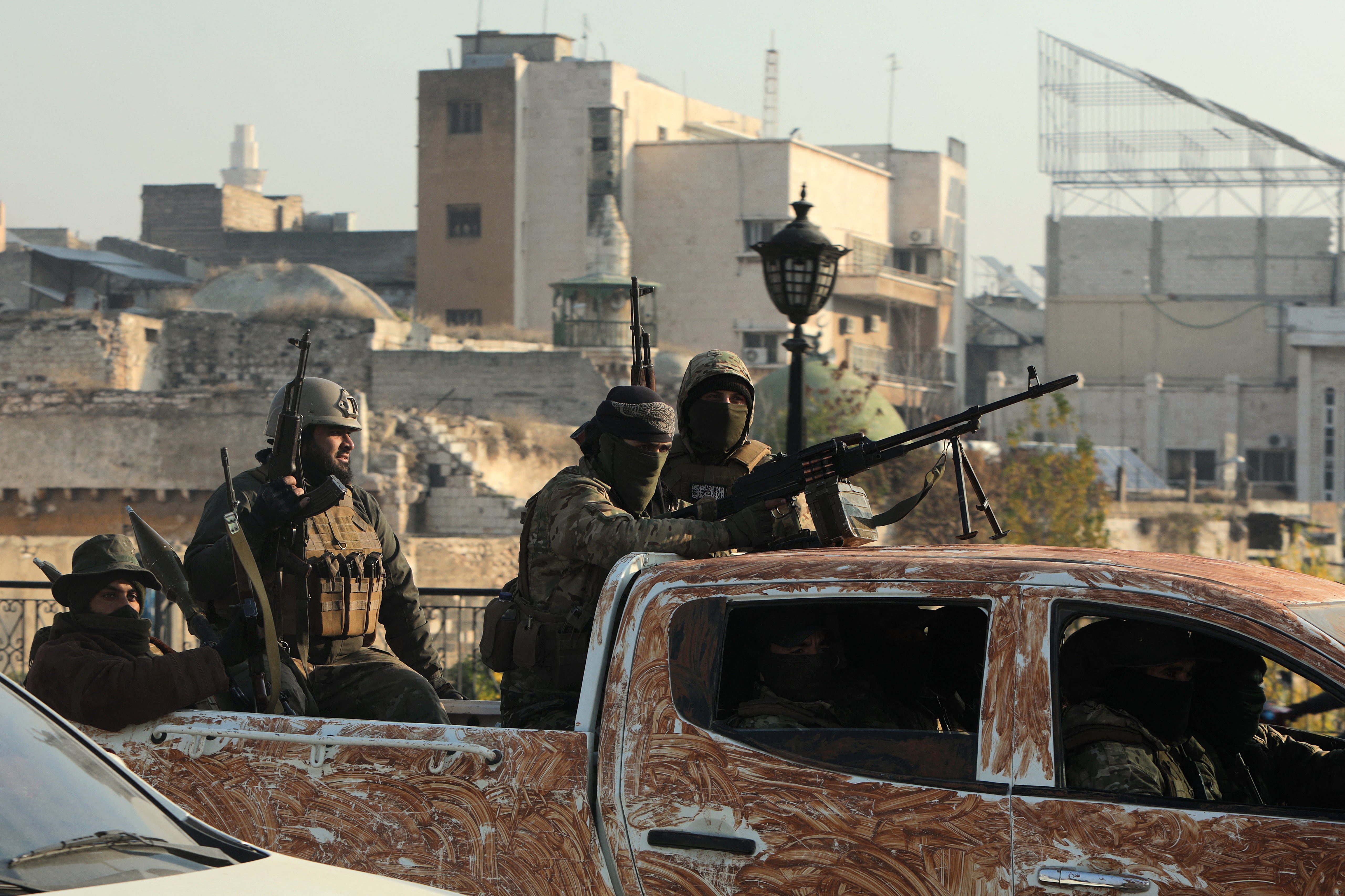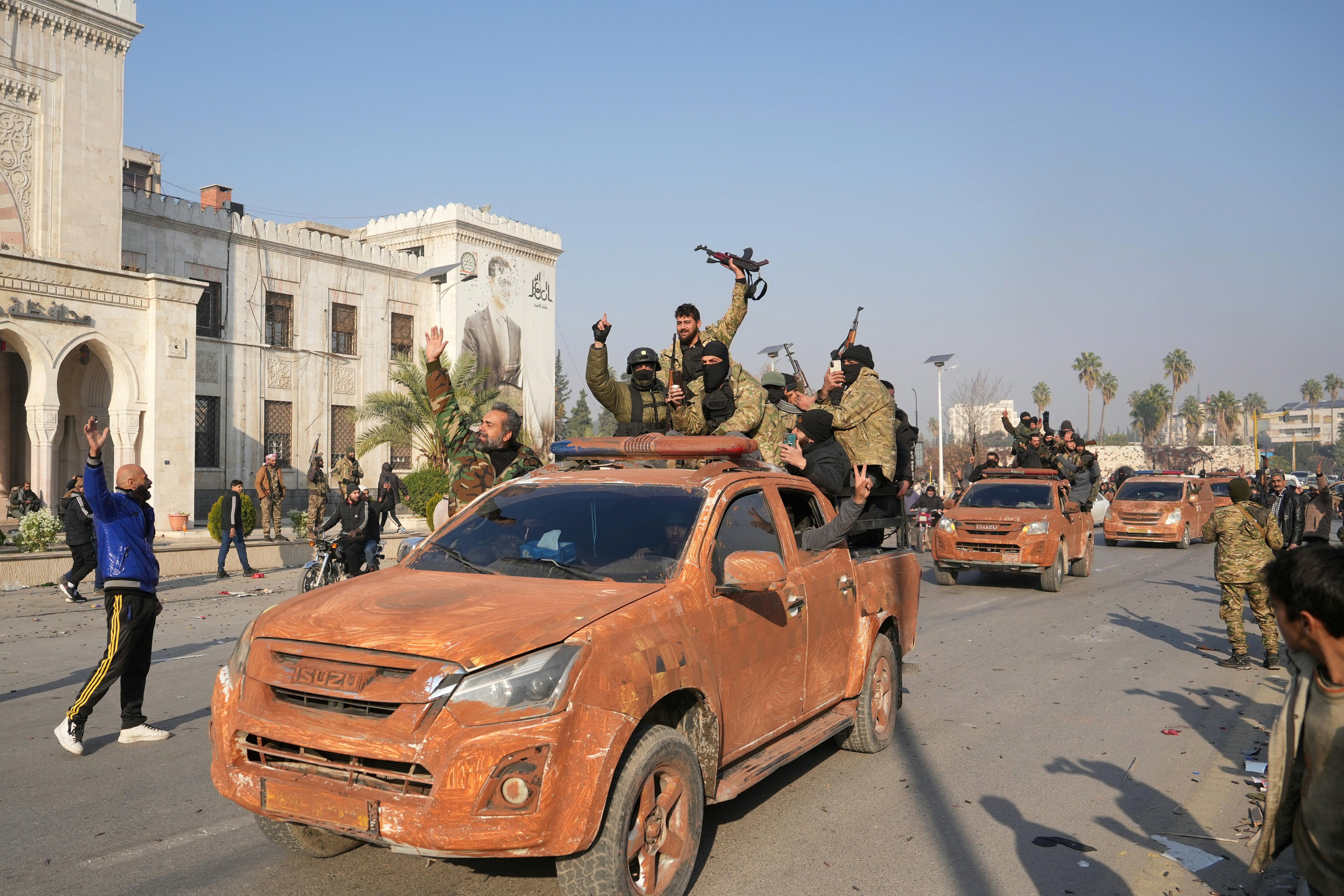Assad regime on brink as Syrian rebels begin to encircle Damascus and claim second city
Since anti-regime fighters swept into Aleppo a week ago, government forces have crumbled across the country as insurgents seized a string of major cities
Your support helps us to tell the story
From reproductive rights to climate change to Big Tech, The Independent is on the ground when the story is developing. Whether it's investigating the financials of Elon Musk's pro-Trump PAC or producing our latest documentary, 'The A Word', which shines a light on the American women fighting for reproductive rights, we know how important it is to parse out the facts from the messaging.
At such a critical moment in US history, we need reporters on the ground. Your donation allows us to keep sending journalists to speak to both sides of the story.
The Independent is trusted by Americans across the entire political spectrum. And unlike many other quality news outlets, we choose not to lock Americans out of our reporting and analysis with paywalls. We believe quality journalism should be available to everyone, paid for by those who can afford it.
Your support makes all the difference.Syrian leader Bashar al-Assad’s 24-year rule appears on the brink of collapse as Syrian rebels claim to be seizing full control of the vital city of Homs and advancing towards the capital Damascus.
The insurgents, led by the jihadi group Hayat Tahrir al-Sham (HTS), said opposition forces have started the “final stage” of their offensive by encircling Damascus.
It is the first time opposition forces have reached the outskirts of the Syrian capital since 2018, when government troops recaptured the region adjacent to the capital following a years-long siege.
Underscoring the possibility of an uprising in the capital, protesters in a Damascus suburb tore down a statue of Mr Assad’s father and smashed it to pieces. In other suburbs soldiers changed into civilian clothes and deserted their posts, residents said.

President Assad remains in Damascus, Syria’s state news agency said.
The insurgents have also entered the suburbs of Homs, according to residents and military sources. The rebels reportedly breached government defences from the north and east of the city. In the early hours of Sunday, Syrian rebel commander Hassan Abdul Ghany said that insurgent forces "fully liberated" Syria's central city of Homs.
A rebel commander said they had also taken control of an army camp and villages outside the city.
The Syrian military, which has been reinforcing Homs and hammering the rebels with intense airstrikes, did not immediately comment on the reports.
Homs, parts of which were controlled by insurgents until 2014, is a major intersection point between Damascus and Syria’s coastal provinces of Latakia and Tartus, where President Assad enjoys wide support and where his Russian allies have a naval base and airbase. Homs province is Syria’s largest in size and borders Lebanon, Iraq and Jordan.
Earlier today, the rebels said they seized control of the southern city of Daraa – the birthplace of the 2011 uprising against Mr Assad – as they pressed on with their lightning advance.

The Syrian army withdrew from much of southern Syria on Saturday, leaving more areas of the country, including two provincial capitals, under the control of opposition fighters.
Since the rebels swept into Aleppo a week ago, government defences have crumbled across the country as insurgents seized a string of major cities and rose up in places where the rebellion had long seemed over.
The rebels have already seized Aleppo in the north, Hama in the centre, Deir ez-Zor in the east and Suweida and Deraa in the south.
Syria’s military said it was carrying out airstrikes around Hama and Homs and reinforcing on that front. It also said it was repositioning around Deraa and Suweida, without acknowledging their capture by rebels.
After years locked behind frozen front lines, the insurgents have burst out of their northwestern stronghold in Idlib and pushed the swiftest battlefield advance by either side since a street uprising against President Assad mushroomed into civil war 13 years ago.
The Syrian president regained control of most of Syria after his major allies – Russia, Iran and Lebanon’s Hezbollah group – came to his aid. However, his allies’ attention has been diverted by other crises, including Vladimir Putin’s invasion of Ukraine and Hezbollah’s conflict with Israel over the war in Gaza. Russia’s embassy in Syria has urged Russian nationals to leave the country.
The rapid pace of these events has prompted fears across the Middle East of a fresh wave of regional instability. Western officials say the Syrian military is in a difficult situation, unable to halt the rebel gains and forced into retreat.
Hezbollah sent some "supervising forces" to Homs on Friday but any significant deployment would risk exposure to Israeli airstrikes, Western officials said. Israel attacked two Lebanon-Syria border crossings on Friday, Lebanon said.
Iran-backed Iraqi militias are on high alert, with thousands of heavily armed fighters ready to deploy to Syria, many of them amassed near the border. Iraq does not seek military intervention in Syria, a government spokesperson said on Friday.
The leader of HTS, Abu Mohammad Al-Julani, said the group aims to “build Syria” and bring Syrian refugees back home from Lebanon and Europe. Another opposition commander, Hassan Abdul Ghany, urged Syria’s military officers to defect in a video statement aired on Friday.
The foreign ministers of Iran, Iraq and Syria – three close allies – gathered in Baghdad on Friday to consult on the rapidly changing situation. Iraqi foreign minister Fuad Hussein expressed “deep concern”, saying his government is closely following the situation in Syria.

Join our commenting forum
Join thought-provoking conversations, follow other Independent readers and see their replies
Comments